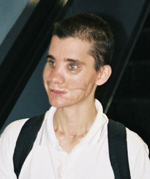

First-Hand Reports
One year after the shooting of Brian Avery
|
|
Yesterday a year ago an Israeli soldier shot my American friend Brian Avery in the face. Yesterday a year ago I stopped running, turned around, and saw Brian laying on his stomach faced down on a street in Jenin. Yesterday a year ago my white T-shirt turned red.
It was the 5th of April 2003 around dinnertime. It was the third day of curfew in Jenin on the occupied West Bank, and it had been an intense day. Israeli soldiers in tanks and jeeps had patrolled the streets and Palestinian boys and young men had risked their lives to be on the street throwing rocks at the occupiers.
We were four ISM activists from Denmark, England and Sweden who had served as “human shields” for a large group of Palestinians kids most of the afternoon. By standing near the rock throwers we believe we are preventing Israeli snipers from killing Palestinian kids for throwing rocks against rocket-proof tanks. The snipers never killed when we were present but frequently when we were not.
I was tired. Approximately 30 Palestinians had been gathered on the main street where three tanks had been driving up and down again and again. But an hour earlier the tanks had left and the centre of town had been quiet since. We had left the group of Palestinians and were on our way back to the ISM apartment when two-three shots went off in the distance. I called one of the two other ISM activists in Jenin, Tobias from Sweden, on the cell phone. He told me that he and Brain were on their way out and would meet us downstairs from the apartment.
He and Brian had spent most of the day sleeping. They had been co- drivers in Palestinian ambulances all night. By experience we know that both patients and medical staff have an easier time with an international co-driver. Then the ambulance is rarely held back at the checkpoints for hours, the driver and patient rarely harassed, and never beaten up.
As the four of us walked towards the intersection I saw Brian and Tobias waiting. The streets were nearly abandoned. No cars, no tanks, and very few people. As we were two hundred feet from the two of them I heard the deep sound of tanks. I saw Brian and Tobias turn to face the street to the right and raise their hands in the air.
As the four of us joined them two tanks came into sight down the street. We were six internationals standing on a row with our hands in the air. We stood on the street to be clearly visible so that the soldiers wouldn’t take us for Palestinians.
The front tank opened fire when it was about fifty feet away. I saw sparks on the street in front of us as bullet hit the pavement. I wanted to stand still but after two-three seconds of non-stop shooting I realized that this was not the normal warning shots. For the first time during my two months in Jenin I got really scared and started running.
After just five-seven steps I turned around. Maybe because of a scream, maybe I sensed something had happened. I saw Brian flat down on his stomach with his hands on his face. He was completely still.
I ran to him and kneeled by his side. I thought shrapnel had hit him from the bullets I had seen making sparks in front of us. I saw his face was in a pool of blood. I asked him to let me see the wound, and he lifted his upper body, turned his face towards me and removed his hands. It looked as if his face had exploded. The right cheek was only attached at the ear.
“This is bad, really bad,” I screamed to my friends that were gathering around us. As I looked up I saw the tanks passing us slowly within fifteen feet distance. “Call an ambulance, and tell them to hurry up,” I screamed.
Panic was getting a grab of me. I looked at Brian’s destroyed face and all the blood, and I couldn’t come up with anything to do. I wanted to use my hands to hold his face in place but I couldn’t get myself to touch it. I was desperately trying to think of something, anything I could do to help him but I couldn’t. I looked up again. The tanks had now passed us as if nothing had happened.
“I don’t know what to do,” I yelled to who ever would listen.
Luckily Ewa did.
“Take off your T-shirt and press it against his face,” she said.
By now the tanks were gone.
I did as she said and it felt good to be able to act. It was a white T-shirt but when the ambulance came less than a minute later it was red. It wasn’t until two hours later I realized that my hands were all red to and I had stains in my face.
Brian woke up two days later in a bed at an Israeli hospital in Haifa. Everyone was amazed by the quick recovery. It had taken the surgeons eight hours to do the first emergency operations. Many more were waiting him. Shortly after started communicating. Not speaking of course. His mouth was all smashed up, and his whole face except for the eyes wrapped up in bandages. The eyes were swollen and he didn’t open them the first week.
But he could hear, and he could remember. His brain seemed undamaged. Right away he started writing short sentences on a piece of paper. No one had dared hope that two days earlier when the surgeon told us the wound was made by a direct shot by a big calibre gun. The bullet had entered through the right cheek just below the eye and exited through the left jar below the ear. Had his face had a slight different angle he would have dropped dead.
One of the first sentences he wrote was: “I feel more Palestinian than ever before.”
Five days after his shooting Brian Avery celebrated his 25th birthday at the hospital in Haifa. The bandages were off and Brian was in a very bad mood. Today he is back with his family in North Carolina. The Israeli Army has yet to take responsibility for his shooting. They send out a press release the same day saying he was caught in crossfire between armed Palestinians and Israeli soldiers returning fire and that it was most likely a Palestinian bullet.
I know that no gun besides the Israeli machinegun opened fire. I know we received no warning before the bullets started coming. I know the soldiers didn’t stop to help.
Is that how it feels being Palestinian?
| Rachel Corrie |
 |
1979 - 2003 |
| Thomas Hurndall |
 |
1981 - 2004 |
| Additional Resources |
Congressional Resolution Expressing sympathy for the loss of Rachel Corrie – Not Yet Passed |
World Bank – 27 Months of Intifada, Closures, and Palestinian Economic Crisis |
| Organizations |
| Stay Informed |
|
Sign up for our mailing list and receive an email whenever we post a new article on our news site, Israel-Palestine News. |
If Americans Knew distributes and posts to our website copyrighted material, sometimes without the permission of the copyright owner. We are making such material available in our efforts to advance understanding of the Israel/Palestine conflict. We believe this constitutes a ‘fair use’ of any such copyrighted material as provided for in section 107 of the US Copyright Law since it is being distributed without profit for purely educational purposes. For more information go to: http://www.law.cornell.edu/uscode/17/107.shtml. If you wish to use copyrighted material from this site for purposes of your own that go beyond ‘fair use’, you must obtain permission from the copyright owner.
This website is printer-friendly. Please Print this article and share it with your friends and family.


